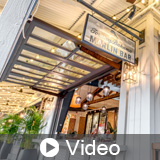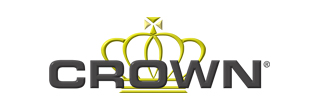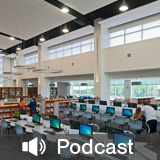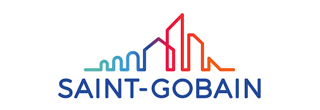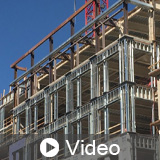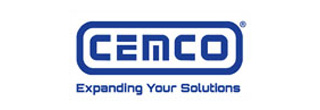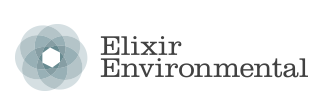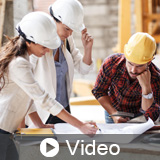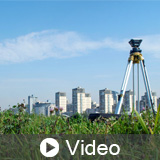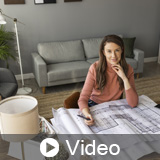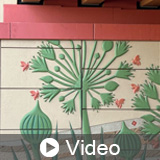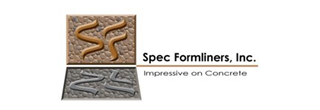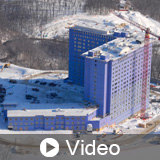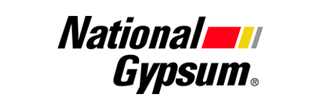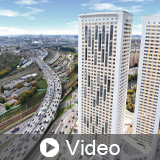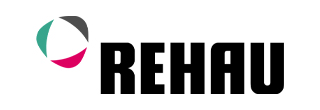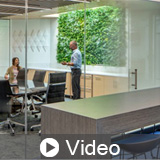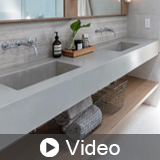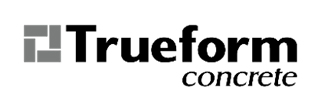A comprehensive exploration of fully automated, hydraulically and electrically driven doors and windows, with a special focus on the cutting-edge technology of vertically folding bifold doors. Participants will appraise the engineering marvels behind hydraulic and electric drive mechanisms and how these systems have transformed the aesthetics and functionality in door design.
FREE |
|
How does cementitious fireproofing contribute to both fire safety and sustainability in modern building design, and what role does it play in achieving LEED v4.1 BD+C certification? This course explores the fundamental principles of cementitious fireproofing, its environmental impact, and its role in sustainable building design. Participants will gain a thorough understanding of how cementitious fireproofing protects buildings and occupants during fires, while also examining its contribution to reducing embodied carbon in LEED v4.1 BD+C projects.
FREE |
|
This course offers architects, designers, engineers, and specification writers a comprehensive foundation of knowledge essential for navigating the dynamic landscape of cold-formed steel framing. Participants will gain practical insights into how this industry aligns with the latest standards in code compliance, structural integrity, fire safety, sound insulation, and sustainable construction practices.
FREE |
|
In this course, we review the intent and applications for prerequisites and credits for the LEED v4.1 BD+C EQ category. We discover strategies to designing healthier spaces by improving indoor environmental quality for occupants. We discuss how indoor environmental quality can improve human health and well-being, worker productivity, and occupant comfort.
$45.00 |
|
Building occupants who can visually connect with outdoor environments while performing everyday tasks experience greater satisfaction, attentiveness, and productivity. In healthcare facilities, providing patients with views and access to nature can shorten hospital stays and reduce stress, depression, and the use of pain medication. Designing for quality views involves consideration of building orientation and site design, facade, and interior layout.
$45.00 |
|
Protecting wildlife and preserving it for future generations is critical. Our planet desperately needs to be safeguarded, with climate change already wreaking havoc on our natural environment. In this course, we describe how to achieve the LEED v4.1 BD+C Protect or Restore Habitat credit and reduce environmental impacts for building sites. We explore how design professionals can preserve high-quality native ecosystems, including their soils, native vegetation, sensitive species habitat, wildlife corridors, and hydrology.
$45.00 |
|
A century ago, everyone could look up and see a spectacular starry night sky. Now, millions of people across the planet will never experience the majestic night sky where they live. The widespread use of artificial light at night is not only impairing our view of the universe, it negatively affects our environment, our safety, our energy consumption, and our health. Light pollution creates an abundance of environmental problems. Wildlife species that hunt or forage at night may be unable to feed.
$45.00 |
|
Have you ever wondered about the untapped potential of esoteric design strategies in shaping the future of sustainable architecture? What design strategies are innovators, disruptors, and mavericks using to advance sustainable design? In this course we explore uncommon LEED v4.1 BD+C pilot credits and review how projects may register for pilot credits and pilot ACPs. Finally, we examine strategies that diverge from the status quo and help design professionals think out of the box to explore new ideas about sustainable design.
$45.00 |
|
In this course, we explore how Health Product Declarations (HPDs) contribute to the LEED v4.1 rating system. Our team discusses how design professionals can achieve the LEED v4.1 BD+C and ID+C Material Ingredients credit. In addition, we review the HPD Open Standard and discuss how it can influence design professionals to make healthier material selections for buildings.
$45.00 |
|
A LEED site assessment evaluates environmental features that the design of a sustainable site and building should take into consideration. A well-developed assessment conducted before or during the conceptual design phase may reduce project costs and risks, promote occupants’ health, and honor a site’s unique characteristics. In this course we describe how project teams can achieve the LEED v4.1 BD+C Site Assessment credit and review resources that can help design professionals meet their goals.
$45.00 |
|
Imagine this scenario: skyscrapers that breathe sustainability, neighborhoods that pulsate with community vibrancy, and cities that hum with innovation. This is the future we envision. Through a captivating blend of in-depth case studies, insightful analyses of proven practices, and visionary examination of cutting-edge ideas, we'll uncover strategies to transform the built environment using LEED. From pioneering sustainable infrastructure to office renovations, every lesson is a step closer to unlocking the potential of our cities.
$45.00 |
|
Noise can negatively affect human health and productivity in the workplace. Poor acoustic performance can critically affect learning in schools and impact healing at healthcare facilities. It is imperative that design professionals balance acoustical design strategies when planning systems and indoor spaces. In this presentation, we discuss the intent and requirements for the LEED v4.1 BD+C and ID+C Credit: Acoustic Performance and how they can help building occupants.
$45.00 |
|
Many low-income communities have sites that are vacant or underutilized because of perceived stigmas or economic barriers. Building a project on a high-priority redevelopment site can revitalize the neighborhood and bring social and economic benefits to the surrounding community. In this course we explain how to achieve the LEED v4.1 BD+C High-Priority Site and Equitable Development credit. Our team discusses how the redevelopment of contaminated sites can improve environmental health.
$45.00 |
|
The LEED v4.1 Materials and Resources (MR) credit category focuses on minimizing the embodied energy and other impacts associated with the extraction, processing, transport, maintenance, and disposal of building materials. The requirements are designed to support a life-cycle approach that improves performance and promotes resource efficiency. In this course, we explore the prerequisites and credits in the LEED v4.1 BD+C Materials and Resources category and discuss how they promote sustainable design for projects.
$45.00 |
|
Join us for an inspiring journey as we explore real-world examples of LEED certified projects that are reshaping our built environment and combating climate change. Through a series of captivating case studies, you'll discover how innovative strategies are dramatically reducing energy and water consumption, creating healthier and more productive spaces for occupants, and paving the way for a more sustainable future. From towering skyscrapers to university centers, each project tells a unique story of environmental stewardship.
$45.00 |
|
Enriching community spaces with architectural art in everyday places. Join us for this one-hour course on architectural plastic, semi-elastomeric, and urethane form liners. Taking traditionally flat, uninspired structural spaces, form liners bring immense value through cultural, historical and naturescape art possibilities. Focused through a community inspired lens, form liners give every project the ability to construct a unique identity worthy of cherished celebration, creating memorable landmark legacy.
FREE |
|
What if there was a single construction material that could withstand extreme weather conditions, resist fire and mold, while also being strong and sustainable? Explore the unparalleled versatility and functionality of gypsum products in providing robust solutions in modern construction practices. We explore gypsum products manufactured with fiberglass facing which replaces the paper facing typically used on gypsum board. Join us, as we discuss the applications, attributes, advantages, and LEED contributions of gypsum products.
FREE |
|
It's challenging these days, when you put up a structure, be it a commercial building or a residence, hotels, etc. Anything that you're putting up there has to have a sound element to it. We're challenged by air traffic, rail traffic, highway traffic, construction site noise, outdoor concert noise; we have it all. Therefore, it's becoming important to understand how to manage this sound. We know that sound can be debilitating.
FREE |
|
This course will explore a real-life example of a 5,000-square-foot office expansion recently completed in Western Massachusetts. We’ll take a deep dive into the owner’s and architect’s primary goals for the space; that it be beautiful, healthy, sustainable, and functional. We’ll learn about the various relevant tools for sustainable, healthy buildings, including the WELL Building Standard, The Works With WELL Program, and the LEED Green Building program.
FREE |
|
Discover the potential of Glass Fiber Reinforced Concrete (GFRC) and explore the benefits of decorative GFRC as we explore its role in creating stunning, healthy spaces that captivate occupants. Review the versatility of GFRC through practical applications in sinks, countertops, panels, cladding, benches, and tables, all while emphasizing sustainability, durability, and low maintenance. Learn about the eco-friendly manufacturing processes that utilize recycled materials and water reduction strategies, ensuring responsible design practices.
FREE |

